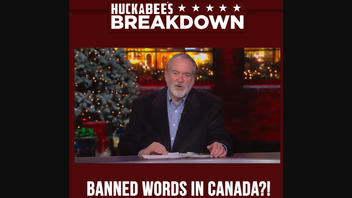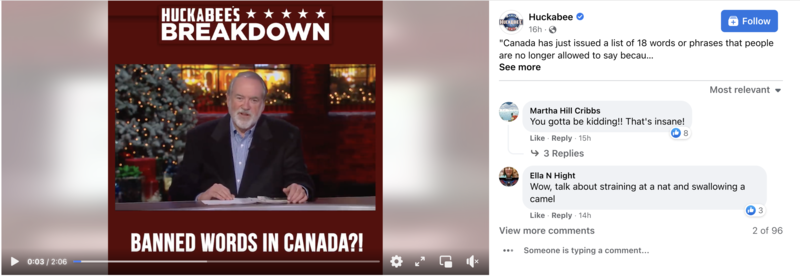
Did Canada recently issue a list of 18 words or phrases that people are no longer allowed to say? No, that's not true: This video is missing context as these words were originally published in a news article about diversity initiatives -- not a policy change recently made by the Canadian government. A public affairs representative from the Canadian Broadcasting Corporation (CBC), which is funded by the Canadian government, tells Lead Stories, "The list was presented to anti-racism and language experts, who said some of these phrases can be hurtful to various groups of people for their historical and cultural context. To be clear, it is not a story about CBC policy or internal practices."
Also, the previously fact-checked public figure who published this post is quoting a false article published on a previously fact-checked, far-right website.
The claim appeared in a video published on Facebook (archived here) on December 21, 2021, under the title, "HUCKABEE'S BREAKDOWN." The caption opened:
"Canada has just issued a list of 18 words or phrases that people are no longer allowed to say because they might offend someone. And some of them have people baffled as to who would be offended by them, or why."
Catch up on the BREAKDOWN now! *American flag emoji here*
This is what the post looked like on Facebook at the time of writing:
(Source: Facebook screenshot taken on Fri Dec 24 01:54:27 2021 UTC)
At 0:13 in the video, the screenshot of a portion of an article published by a company named "Zero Hedge" appears, and the voice of former Arkansas Gov. Mike Huckabee is heard saying:
Canada has just issued a list of 18 words or phrases people are no longer allowed to say because they might offend someone.
Lead Stories has previously debunked Huckabee for spreading false claims regarding COVID-19 testing and suggested polling on behalf of Donald Trump. Zero Hedge, a far-right libertarian financial blog, has also been previously debunked by lead Stories regarding claims about COVID-19 vaccinations.
The disclaimer on the Zero Hedge platform, in part, reads:
We do not verify or confirm any portion of the Information. We do not conduct any due diligence or research any aspect of the Information including the completeness, accuracy, truthfulness or reliability of the Information.
A Google search using the keywords, "Canada recently issued a list of 18 words and phrases that people are no longer allowed to say" produced no significant news results that would suggest a recent government policy change by Canada. It does, however, display a November 29, 2021, CBC article, titled "Words and phrases you may want to think twice about using," which features the words cited in the post.
Lead Stories emailed CBC about this claim and got a response on December 23, 2021. They told us that:
CBC Ottawa compiled a small list of words, submitted by readers and some of our journalists who are Black, Indigenous and people of colour. The list was presented to anti-racism and language experts, who said some of these phrases can be hurtful to various groups of people for their historical and cultural context. To be clear, it is not a story about CBC policy or internal practices. Our internal language guidance is regularly assessed and updated to reflect the latest research, industry standards and cultural sensitivities. That is a separate process independent of journalism.
Prohibition is also not possible as Section 2b of The Canadian Charter of Rights and Freedoms still stands, stating:
Everyone has the following fundamental freedoms: freedom of thought, belief, opinion and expression, including freedom of the press and other media of communication."



















